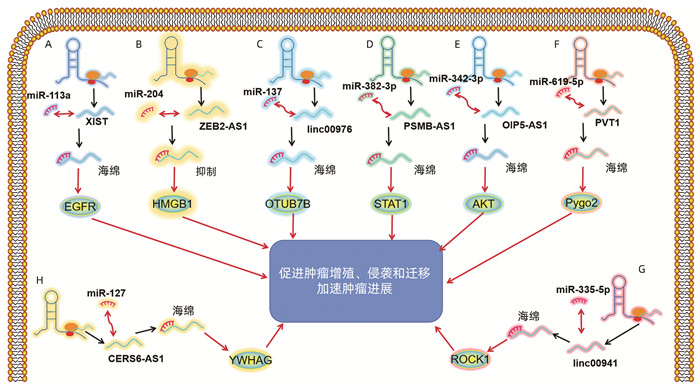长链非编码RNA对胰腺癌侵袭转移分子机制的影响
DOI: 10.3969/j.issn.1001-5256.2022.01.043
Research advances in the molecular mechanism of long non-coding RNA in invasion and metastasis of pancreatic cancer
-
摘要: 胰腺癌是一种恶性程度极高的消化道肿瘤,由于其高度侵袭转移特性,使得目前胰腺癌患者的总体生存率仍非常低。长链非编码RNA(lncRNA)可通过表观遗传调控、转录调控或转录后调控等多种方式参与胰腺癌的发生发展及侵袭转移过程。lncRNA在胰腺癌中表达失调,并通过特定调控方式使其发生上皮间充质转化,进而引起肿瘤细胞生物学行为发生改变。本文就研究lncRNA在胰腺癌中促使其发生上皮间充质转化,作为ceRNA调控肿瘤的生物学功能,并通过调控肿瘤细胞铁死亡、自噬及外泌体等多途径影响胰腺癌发生侵袭转移进行简要综述,为胰腺癌的早期诊断及治疗提供理论依据和新的靶点。Abstract: As a highly malignant gastrointestinal tumor, pancreatic cancer is highly invasive and metastatic, which leads to the low overall survival rate of patients with pancreatic cancer. Studies have shown that long non-coding RNA (lncRNA) is involved in the development, progression, invasion, and metastasis of pancreatic cancer through epigenetic, transcriptional or post-transcriptional regulation. Dysregulated expression of lncRNA is observed in pancreatic cancer and induces epithelial mesenchymal transition (EMT) through specific regulatory mechanisms, thereby causing the changes in the biological behavior of tumor cells. This article reviews the mechanisms of lncRNA in promoting EMT, regulating tumor biological function as competing endogenous RNA, and affecting the development, invasion, and metastasis of pancreatic cancer via multiple pathways by regulating the ferroptosis, autophagy, and exosome of tumor cells, in order to provide a theoretical basis and new targets for the early diagnosis and treatment of pancreatic cancer.
-
Key words:
- Pancreatic Neoplasms /
- RNA, Long Noncoding /
- Neoplasm Invasiveness /
- Neoplasm Metastasis
-
注:A,lncRNA XIST作为ceRNA下调miR-113a,靶向调控EGFR促进胰腺癌侵袭转移;B,lncRNA ZEB2-AS1协同miR-204相互抑制,上调HMGB1机制;C,lnc00976通过下调miR-137,使OTUD7B上调,激活下游EGFR/MAPK信号通路;D,lncRNA PSMB8-AS1通过调控miR-382-3p,使下游靶基因STAT1上调;E,lncRNA OIP5-AS1作为海绵吸附miR-342-3p,调控并激活AKT/ERK信号通路;F,lcnRNA PVT1调控miR-619-5p激活Pygo2和ATG14;G,lcnRNA 00941调控miR-335-5p,上调ROCK1后激活LIMK1/Cofilin-1信号通路;H,lcnRNA CERS6-AS1通过竞争性结合miR-127,上调YWHAG并磷酸化RAF1,激活ERK信号通路。
图 1 lncRNA协同miRNA调控下游靶点影响胰腺癌侵袭和转移机制
表 1 lncRNA协同miRNA调控下游靶点介导胰腺癌侵袭转移相关研究
lncRNA名称 miRNA靶标 下游靶点/通路 协同方式 lncRNA XIST(上调) miR-113a(下调) EGFR 海绵/诱饵[21] lncRNA ZEB2-AS1(上调) miR-204(下调) HMGB1 相互抑制[22] lnc00976(上调) miR-137(下调) OTUD7B,下游EGFR/MAPK信号通路 海绵/诱饵[23] lncRNA PSMB8-AS1(上调) miR-382-3p(下调) STAT1 海绵/诱饵[24] lncRNA OIP5-AS1(上调) miR-342-3p(下调) AKT/ERK信号通路 海绵/诱饵[25] lcnRNA PVT1(上调) miR-619-5p(下调) Pygo2、ATG14 海绵/诱饵[9] lcnRNA 00941(上调) miR-335-5p(下调) ROCK1,下游LIMK1/Cofilin-1信号通路 海绵/诱饵[26] lcnRNA CERS6-AS1(上调) miR-127(下调) YWHAG、p-RAF1,ERK信号通路 海绵/诱饵[27] -
[1] JIANG M, NI J, CUI W, et al. Emerging roles of lncRNA in cancer and therapeutic opportunities[J]. Cancers, 2019, 9(7): 1354-1366. DOI: 10.3390/cancers12123843. [2] DALGLEISH AG, STEBBING J, ADAMSON DJ, et al. Randomised, open-label, phase Ⅱ study of gemcitabine with and without IMM-101 for advanced pancreatic cancer[J]. Br J Cancer, 2016, 115(7): 789-796. DOI: 10.1038/bjc.2016.271. [3] WAN J. Research progress of exosomes long chain non-coding RNA in pathogenesis and molecular diagnosis of pancreatic cancer[J]. China Med Pharm, 2021, 11(3): 42-45. DOI: 10.3969/j.issn.2095-0616.2021.03.011.万君. 外泌体长链非编码RNA在胰腺癌发病机制及分子诊断中的研究进展[J]. 中国医药科学, 2021, 11(3): 42-45. DOI: 10.3969/j.issn.2095-0616.2021.03.011. [4] XIE Y, ZHANG Y, DU L, et al. Circulating long noncoding RNA act as potential novel biomarkers for diagnosis and prognosis of non-small cell lung cancer[J]. Mol Oncol, 2018, 12(5): 648-658. DOI: 10.1002/1878-0261.12188. [5] LIU H, HAN L, LIU Z, et al. Long noncoding RNA MNX1-AS1 contributes to lung cancer progression through the miR-527/ BRF2 pathway[J]. J Cell Physiol, 2019, 234(8): 13843-13850. DOI: 10.1002/jcp.28064. [6] BANFAI B, JIA H, KHATUN J, et al. Long noncoding RNAs are rarely translated in two human cell lines[J]. Genome Res, 2012, 22(9): 1646-1657. DOI: 10.1101/gr.134767.111. [7] TAHIRA AC, KUBRUSLY MS, FARIA MF, et al. Long noncoding intronic RNAs are differentially expressed in primary and metastatic pancreatic cancer[J]. Mol Cancer, 2011, 10: 141. DOI: 10.1186/1476-4598-10-141. [8] LIU M, YANG YT, XU G, et al. CCG: An integrative resource of cancer protein-coding genes and long noncoding RNAs[J]. Discov Med, 2016, 22(123): 351-359. https://pubmed.ncbi.nlm.nih.gov/28147217/ [9] YOSHIDA K, TODEN S, RAVINDRANATHAN P, et al. Curcumin sensitizes pancreatic cancer cells to gemcitabine by attenuating PRC2 subunit EZH2, and the lncRNA PVT1 expression[J]. Carcinogenesis, 2017, 38(10): 1036-1046. DOI: 10.1093/carcin/bgx065. [10] CAI H, YAO J, AN Y, et al. LncRNA HOTAIR acts a competing endogenous RNA to control the expression of notch3 via sponging miR-613 in pancreatic cancer[J]. Oncotarget, 2017, 8(20): 32905-32917. DOI: 10.18632/oncotarget.16462. [11] CHEN L, ZHANG J, CHEN Q, et al. Long noncoding RNA SOX2OT promotes the proliferation of pancreatic cancer by binding to FUS[J]. Int J Cancer, 2020, 147(1): 175-188. DOI: 10.1002/ijc.32827. [12] AIELLO NM, BRABLETZ T, KANG Y, et al. Upholding a role for EMT in pancreatic cancer metastasis[J]. Nature, 2017, 547(7661): E7-E8. DOI: 10.1038/nature22963. [13] XING SN, CHEN W, YU HY. Research status of mesenchymal stem cells on tumorigenesis and development[J]. Clin J Med Offic, 2020, 48(8): 980-982. DOI: 10.16680/j.1671-3826.2020.08.45.邢思宁, 陈伟, 于卉影. 间充质干细胞对肿瘤发生发展影响研究现状[J]. 临床军医杂志, 2020, 48(8): 980-982. DOI: 10.16680/j.1671-3826.2020.08.45. [14] XU J, LIU S, YANG X, et al. Paracrine HGF promotes EMT and mediates the effects of PSC on chemoresistance by activating c-Met/PI3K/Akt signaling in pancreatic cancer in vitro[J]. Life Sci, 2020, 263: 118523. DOI: 10.1016/j.lfs.2020.118523. [15] TERASHIMA M, ISHIMURA A, WANNA-UDOM S, et al. MEG8 long noncoding RNA contributes to epigenetic progression of the epithelial-mesenchymal transition of lung and pancreatic cancer cells[J]. J Biol Chem, 2018, 293(47): 18016-18030. DOI: 10.1074/jbc.RA118.004006. [16] WU L, ZHU L, LI Y, et al. Correction to: LncRNA MEG3 promotes melanoma growth, metastasis and formation through modulating miR-21/E-cadherin axis[J]. Cancer Cell Int, 2020, 20: 158. DOI: 10.1186/s12935-020-01239-2. [17] CHEN CW, FU M, DU ZH, et al. Long noncoding RNA MRPL23-AS1 promotes adenoid cystic carcinoma lung metastasis[J]. Cancer Res, 2020, 80(11): 2273-2285. DOI: 10.1158/0008-5472.CAN-19-0819. [18] SHEN J, HONG L, YU D, et al. LncRNA XIST promotes pancreatic cancer migration, invasion and EMT by sponging miR-429 to modulate ZEB1 expression[J]. Int J Biochem Cell Biol, 2019, 113: 17-26. DOI: 10.1016/j.biocel.2019.05.021. [19] GAO Y, ZHANG Z, LI K, et al. Linc-DYNC2H1-4 promotes EMT and CSC phenotypes by acting as a sponge of miR-145 in pancreatic cancer cells[J]. Cell Death Dis, 2017, 8(7): e2924. DOI: 10.1038/cddis.2017.311. [20] ZHENG S, CHEN H, WANG Y, et al. Long non-coding RNA LOC389641 promotes progression of pancreatic ductal adenocarcinoma and increases cell invasion by regulating E-cadherin in a TNFRSF10A-related manner[J]. Cancer Lett, 2016, 371(2): 354-365. DOI: 10.1016/j.canlet.2015.12.010. [21] WEI W, LIU Y, LU Y, et al. LncRNA XIST promotes pancreatic cancer proliferation through miR-133a/EGFR[J]. J Cell Biochem, 2017, 118(10): 3349-3358. DOI: 10.1002/jcb.25988. [22] GAO H, GONG N, MA Z, et al. LncRNA ZEB2-AS1 promotes pancreatic cancer cell growth and invasion through regulating the miR-204/HMGB1 axis[J]. Int J Biol Macromol, 2018, 116(545-551). DOI: 10.1016/j.ijbiomac.2018.05.044. [23] LEI S, HE ZW, CHEN TX, et al. Long noncoding RNA 00976 promotes pancreatic cancer progression through OTUD7B by sponging miR-137 involving EGFR/MAPK pathway[J]. J Exp Clin Cancer Res, 2019, 38(1): 470. DOI: 10.1186/s13046-019-1388-4. [24] ZHANG H, ZHU CH, HE ZW, et al. LncRNA PSMB8-AS1 contributes to pancreatic cancer progression via modulating miR-382-3p/STAT1/PD-L1 axis[J]. J Exp Clin Cancer Res, 2020, 39(1): 179. DOI: 10.1186/s13046-020-01687-8. [25] ZHANG F, LI J, XIAO H, et al. AFAP1-AS1: A novel oncogenic long non-coding RNA in human cancers[J]. Cell Prolif, 2018, 51(1): e12397. DOI: 10.1111/cpr.12397. [26] WANG J, HE ZW, XU J, et al. Long noncoding RNA LINC00941 promotes pancreatic cancer progression by competitively binding miR-335-5p to regulate ROCK1-mediated LIMK1/Cofilin-1 signaling[J]. Cell Death Dis, 2021, 12(1): 36. DOI: 10.1038/s41419-020-03316-w. [27] XU J, WANG J, HE Z, et al. LncRNA CERS6-AS1 promotes proliferation and metastasis through the upregulation of YWHAG and activation of ERK signaling in pancreatic cancer[J]. Cell Death Dis, 2021, 12(7): 648. DOI: 10.1038/s41419-021-03921-3. [28] MENG XP, MA J, WANG BS, et al. Long non-coding RNA OIP5-AS1 promotes pancreatic cancer cell growth through sponging miR-342-3p via AKT/ERK signaling pathway[J]. J Physiol Biochem, 2020, 76(2): 301-315. DOI: 10.1007/s13105-020-00734-4 [29] GAI C, LIU C, WU X, et al. MT1DP loaded by folate-modified liposomes sensitizes erastin-induced ferroptosis via regulating miR-365a-3p/NRF2 axis in non-small cell lung cancer cells[J]. Cell Death Dis, 2020, 11(9): 751. DOI: 10.1038/s41419-020-02939-3. [30] HIRSCHHORN T, STOCKWELL BR. The development of the concept of ferroptosis[J]. Free Radic Biol Med, 2019, 133: 130-143. DOI: 10.1016/j.freeradbiomed.2018.09.043. [31] PAN L, ZHOU L, YIN W, et al. miR-125a induces apoptosis, metabolism disorder and migrationimpairment in pancreatic cancer cells by targeting Mfn2-related mitochondrial fission[J]. Int J Oncol, 2018, 53(1): 124-136. DOI: 10.3892/ijo.2018.4380. [32] HAYANO M, YANG WS, CORN CK, et al. Loss of cysteinyl-tRNA synthetase (CARS) induces the transsulfuration pathway and inhibits ferroptosis induced by cystine deprivation[J]. Cell Death Differ, 2016, 23(2): 270-278. DOI: 10.1038/cdd.2015.93. [33] ZHOU C, YI C, YI Y, et al. LncRNA PVT1 promotes gemcitabine resistance of pancreatic cancer via activating Wnt/β-catenin and autophagy pathway through modulating the miR-619-5p/Pygo2 and miR-619-5p/ATG14 axes[J]. Mol Cancer, 2020, 19(1): 118. DOI: 10.1186/s12943-020-01237-y. [34] LI L, CHEN H, GAO Y, et al. Long Noncoding RNA MALAT1 promotes aggressive pancreatic cancer proliferation and metastasis via the stimulation of autophagy[J]. Mol Cancer Ther, 2016, 15(9): 2232-2243. DOI: 10.1158/1535-7163.MCT-16-0008. [35] MAUSE SF, WEBER C. Microparticles: Protagonists of a novel communication network for intercellular information exchange[J]. Circ Res, 2010, 107(9): 1047-1057. DOI: 10.1161/CIRCRESAHA.110.226456. [36] MAIA J, CAJA S, STRANO MORAES MC, et al. Exosome-based cell-cell communication in the tumor microenvironment[J]. Front Cell Dev Biol, 2018, 6: 18. DOI: 10.3389/fcell.2018.00018. [37] LI Z, JIANG P, LI J, et al. Tumor-derived exosomal lnc-Sox2ot promotes EMT and stemness by acting as a ceRNA in pancreatic ductal adenocarcinoma[J]. Oncogene, 2018, 37(28): 3822-3838. DOI: 10.1038/s41388-018-0237-9. [38] ZHANG C, MENG D, ZHANG BY. The role of exocrine in the diagnosis of pancreatic cancer[J]. J Clin Hepatol, 2019, 35(5): 1165-1167. DOI: 10.3969/j.issn.1001-5256.2019.05.053.张程, 孟迪, 张禀业. 外泌体在胰腺癌诊断中的作用[J]. 临床肝胆病杂志, 2019, 35(5): 1165-1167. DOI: 10.3969/j.issn.1001-5256.2019.05.053. [39] ZHANG H, SHI X, HUANG T, et al. Dynamic landscape and evolution of m6A methylation in human[J]. Nucleic Acids Res, 2020, 48(11): 6251-6264. DOI: 10.1093/nar/gkaa347. [40] LIU Z, ZHANG JZ. Most m6A RNA modifications in protein-coding regions are evolutionarily unconserved and likely nonfunctional[J]. Mol Biol Evol, 2018, 35(3): 666-675. DOI: 10.1093/molbev/msx320. [41] KONG F, LIU X, ZHOU Y, et al. Downregulation of METTL14 increases apoptosis and autophagy induced by cisplatin in pancreatic cancer cells[J]. Int J Biochem Cell Biol, 2020, 122: 105731. DOI: 10.1016/j.biocel.2020.105731. [42] ZHAO Y. Effect of m6A demethylation ALKBH5 on malignant biological behavior of pancreatic cancer and its mechanism[D]. Wuhan: Huazhong University of Science and Technology, 2018.赵炎. m6A去甲基化酶ALKBH5对胰腺癌恶性生物学行为的影响及机制的研究[D]. 武汉: 华中科技大学, 2018. [43] ZHANG C, ZHANG M, GE S, et al. Reduced m6A modification predicts malignant phenotypes and augmented Wnt/PI3K-Akt signaling in gastric cancer[J]. Cancer Med, 2019, 8(10): 4766-4781. DOI: 10.1002/cam4.2360. [44] WU Y, YANG X, CHEN Z, et al. m6A-induced lncRNA RP11 triggers the dissemination of colorectal cancer cells via upregulation of Zeb1[J]. Mol Cancer, 2019, 18(1): 87. DOI: 10.1186/s12943-019-1014-2. 期刊类型引用(3)
1. 赵远红,陈茂艳,杨瑞雪,吕强. 隐源性肝癌与病毒性肝癌临床特征比较. 中西医结合肝病杂志. 2020(02): 107-110 .  百度学术
百度学术2. 赵远红,吕强,杨瑞雪,陈茂艳. 14例病理诊断明确的隐源性肝癌临床资料分析. 中医肿瘤学杂志. 2020(02): 19-23+38 .  百度学术
百度学术3. 张杨,孙立哲,刘宝刚,耿翠翠,董妙,李磊强,李欣. 颅内血管外皮细胞瘤MRI影像学特征与ki67因子表达相关性研究. 临床军医杂志. 2017(12): 1267-1269 .  百度学术
百度学术其他类型引用(0)
-




 PDF下载 ( 2998 KB)
PDF下载 ( 2998 KB)


 下载:
下载:
 百度学术
百度学术

